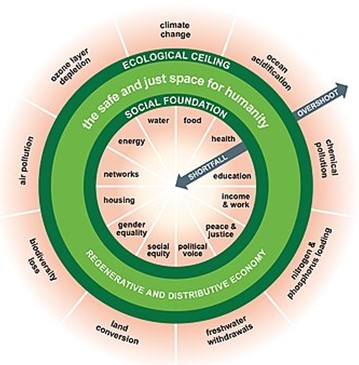In this article, I discuss different perspectives, which could help us to incorporate sustainability more fully into business practice.

Stakeholder analysis
Edward Freeman’s concept of stakeholder analysis is often used as a strategic management theory to identify people and groups who have a vested interest in a business’s activities. This approach encompasses seeking engagement with such groups as employees, suppliers, competitors, members of the local community and others in the direct communication channels of the company. However, concerns regarding the Earth and its natural resources are largely omitted and may only be heard through specialist lobbying groups.
In my own experience, as an Open University tutor and business consultant, I’ve conducted many stakeholder analyses, often classified by the following dimensions:
- Power – those able to marshal the means to impose their will.
- Legitimacy – those who have little input in the decision-making but whose concerns are viable.
- Urgency – those who can create a call for action.
In practice, businesses tend to focus on the mechanisms of finance in all its forms: from managers who organise the manner of work, employees who carry out tasks, through to the end customer. Costing, financing and monetary values are put on all inputs, processes and outputs. When stakeholder analysis is applied in this finance-driven way, it has little, or nothing to say about sustainability. It’s essential to challenge this kind of business ideology, often termed ‘the race to the bottom’ if we are to achieve sustainable goals and the challenge of attaining Net Zero emissions.
People, planet and philosophy
In his seminal (1973) book, Small is Beautiful: A Study of Economics as if People Mattered, Fritz Schumacher refers to the ‘ecological problem,’ citing that issues for the use of natural resources of business are ‘neither technical, nor an economic, but primarily a metaphysical problem.’ This perspective relies on a sustainable structure as the focus of economic activity, such as land usage and the natural resources of a place.
As the world is ruled from towns [cities] where men [and women] are cut off from any form of life other than human, the feeling of belonging to a (natural) ecosystem is not revived. - Fritz Schumacher, p.44
It is this disconnect that permeates through business management philosophy and in stakeholder identification.
Although there is work ongoing in this area, there is not yet a widely held view of how natural resources, carbon emissions and environmental concerns are heard at a strategic level in large organisations in particular. There is much concern for the
way we interact with our natural environment, local community ecosystems and the continued reliance on oil and gas to furnace the business’s focus on growth.
In order to realise the power our natural systems have with regard to business inputs and processes, there needs to be a vision. There is a growing body of work around these types of issues in business pedagogy. Kate Raworth, for example, whose ‘Doughnut Economics,’ considers planetary boundaries. She argues these boundaries should be protected as there are ‘unacceptable environment degradation and potential tipping points in Earth systems.’ This approach imagines a deeper connection between the firm, society and the Earth.
Raworth’s doughnut model certainly takes us further toward an environmental perspective of business sustainability and cohabitation with natural resources. There remains a steep learning curve for how we voice these issues in business practice. The disconnect between the natural environment has created a reality where we tend to value economic purpose far more than the ecological functions that enable us to live and thrive.
Power, urgency, legitimacy: the stakeholder’s legacy
According to the Carbon Majors Report (2017), the highest carbon-emitting companies are investor-owned. These are a small number of large producers, who are responsible for 71% of global industrial greenhouse gas emissions. It would seem that despite the best efforts of Schumacher, Freeman and many others, the planet still lacks proper representation in the boardroom of these large corporations. Perhaps, with hindsight, we may see that they have been the initiators creating the call to action with their vision – the issue of urgency. In stakeholder analysis environmental lobbying groups, the informed consumer voicing environmental concerns, leave the planet, it could be argued, as a legitimate stakeholder but with little power.
Recognising the value of connecting with the natural environment and respecting a stakeholder perspective of the planet is key to re-visioning business practices and their connections to the natural environment.




Rate and Review
Rate this article
Review this article
Log into OpenLearn to leave reviews and join in the conversation.
Article reviews